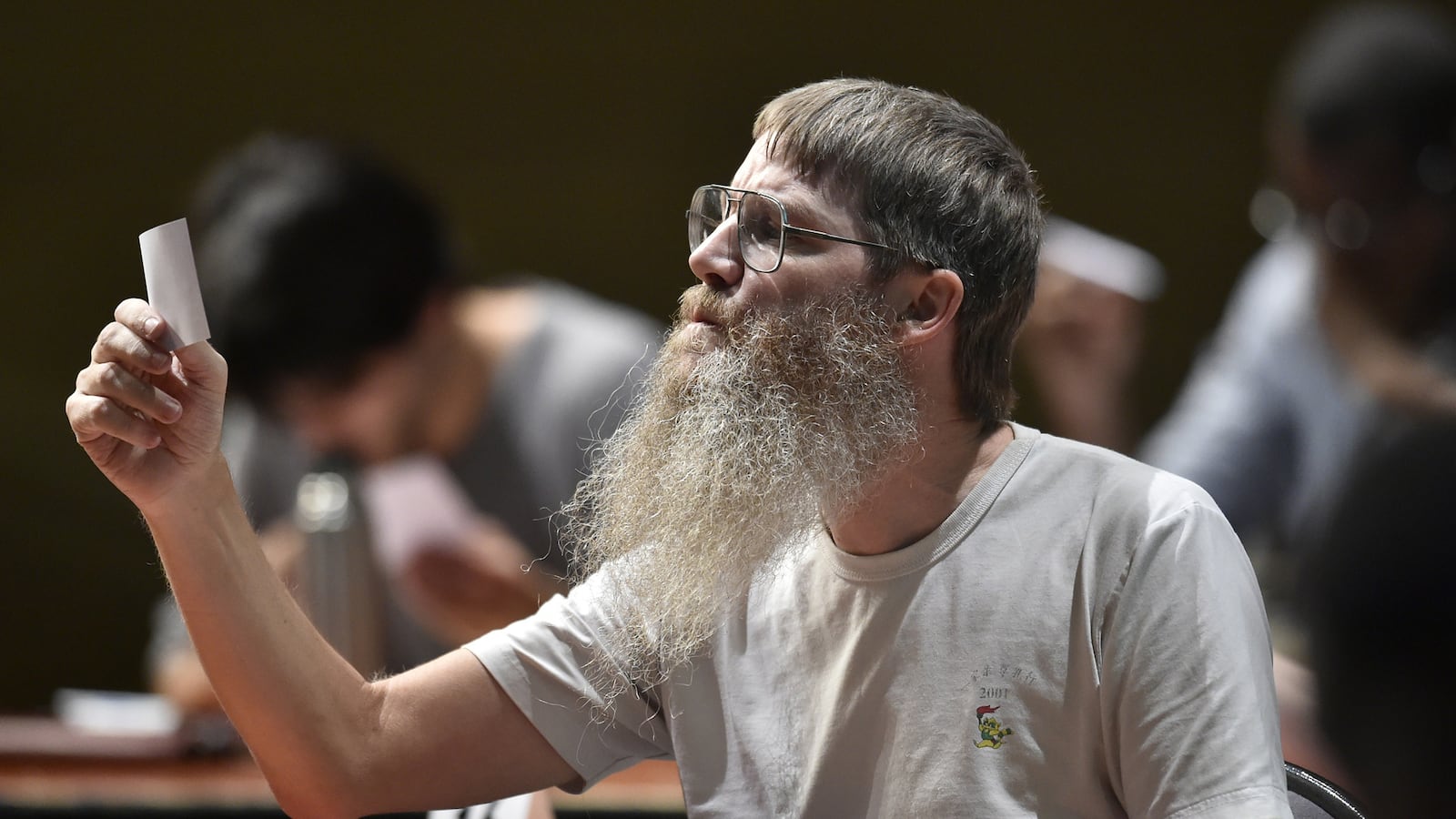The odds of winning the French World Scrabble Championship were seemingly stacked against Nigel Richards, a New Zealander who doesn’t speak the language.
Imagine, then, the collective gasps from French spectators when Richards called out his French-speaking rival for misconjugating a verb during Monday’s final in Belgium.
Or when he spelled out obscure words that many French people don’t even know, gingerly plucking from his tile holder the letters for “énouât,” the imperfect subjunctive of the verb énouer, which means “to remove knots.”
Indeed, the world of competitive Scrabble marveled as 48-year-old Richards clinched an easy victory last night, bringing the predominantly French-speaking crowd to its feet.
Currently ranked first in North America, Richards, who moved to Malaysia in 2000, is a three-time champion of the English World Scrabble Championship. He’s also won the U.S. National Scrabble Championships five times and the United Kingdom Scrabble Open six times.
But winning in a foreign language is such a remarkable achievement that even the best Scrabble players and experts of the game refer to themselves as “mere mortals” next to Richards.
The only other people to win in a foreign language are Pakorn Nemitrmansuk, one of Thailand’s top Scrabble players who won the 2009 World Championship in English, and Panupol Sujjayakorn, also Thai, who won the World Championship in English in 2003.
Thailand teaches Scrabble as part of its English-learning school curriculums, but the best players can’t string sentences together.
According to the Belgian Scrabble Federation, which hosted the French contest in Louvain-la-Neuve, Richards memorized the French Scrabble dictionary in just nine weeks leading up to Monday’s final.
“It’s an astounding achievement,” Stefan Fatsis, an American Scrabble expert and author of Word Freak: Heartbreak, Triumph, Genius, and Obsession In The World of Competitive Scrabble Players (2001), told The Daily Beast, noting that there are 368,000 words in the French Scrabble dictionary.
To put that number in perspective, there are 280,000 words in the International English Scrabble dictionary and roughly 187,000 words in the North American Scrabble dictionary.
Nigel has been victorious when playing with all three lists, which is especially difficult when you consider that a player has to effectively compartmentalize tens of thousands of words when playing with different lists.
“It’s always been a challenge for players to separate the two English lexicons,” said Fatsis. “Most players give up and focus on one. So for Nigel to have that kind of computer program lexicon gives him a huge advantage. It takes him less time to learn these words than us mortals, and his retention seems to be pretty close to complete.”
Amateur Scrabblephiles may think a wide-ranging vocabulary is crucial to being a good Scrabble player.
But Richards’s latest victory proves the opposite is true, and echoes new research on the neuroscience of Scrabble published in April, 2015 in the journal Cortex.
People have long speculated that Scrabble competitors, much like chess players, are mathematically inclined, but there was no neurological data to back up that assertion.
The Cortex study is “the first study where we’ve gathered brain data that shows what’s actually going on in term of word recognition and brain control,” said study co-author Penny Pexman.
The study concluded what we’ve long assumed: competitive Scrabble players don’t really consider the meaning of the words they’re playing, and in many cases—as with Richards—they don’t have any knowledge of their meaning.
The game is an exercise in “pattern recognition and visual familiarity instead of a vocabulary measure,” said Pexman.
People like Richards are less adept at using words to communicate than they are at using them as “plays.”
Fatsis also points out the additional challenge of factoring in different point values for different lexicons. “A good synergy of letters to keep [on your board] in English may not apply in French, which is another hurdle Richards would have to overcome in learning the lexicon that quickly.”
Richards, who rarely gives interviews—he declined to speak to the press after his latest victory—certainly looks the part of reclusive Scrabble wizard, with his frizzy Darwinian beard and oversized spectacles.
But Fatsis says he’s a “lovely guy,” having interviewed him for Word Freak and seen him at subsequent tournaments over the years.
In Word Freak, when one of Nigel’s competitors tells him he can “never tell whether you won or lost,” Nigel replies, “That’s because I don’t care.”
He doesn’t seem to care any more now than he did 15 years ago.
“Nigel has this equanimity about him that is unlike anyone else in the game,” Fatsis told me. “He plays because he likes the intellectual challenge, but he doesn’t seem outwardly to care in the same way that other players do. And that sets him apart.”
Chris Cree, the president of the North American Scrabble Association, described him as a “rare bird” with a “wry sense of humor.”
“He’s not very social but he’s certainly friendly,” Cree added, before boasting that he’s beaten Richards twice in the four times he’s played against him.
Like Fatsis, Cree also applauded Richards’s ability to compartmentalize different lexicons, “whereas I basically pay attention to the North American dictionary and that’s it.”
Reporters who are still hoping to interview Richards would be wise to give up. The North American Scrabble Association has received a number of calls and emails asking for Nigel’s contact details. They crafted a polite “no thank you” response, and sent it to Nigel for feedback.
“He responded and joked that we could be a little less polite,” Cree said.
This copy was amended on Thursday, July 23 to take account of Panupol Sujjayakorn's 2003 victory in the World Scrabble Championship in English.





